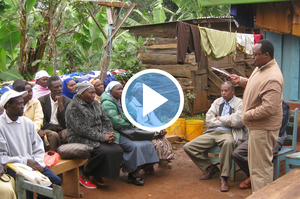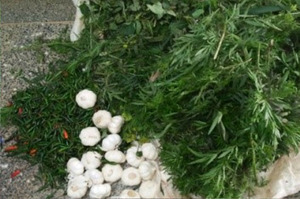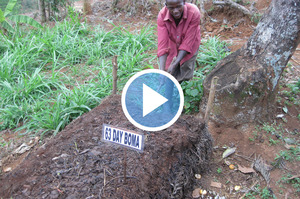Participatory on-farm research (POR) Kenya
As an additional component to the long-term farming systems comparison experiments in Kenya, the participatory on-farm research (POR) activity for organic farmers was started in January 2009. Group discussions were held, focusing on problem analysis and prioritisation together with farmers and subsequent brainstorming on possible activities to address them. Currently, the team is working on two topics: Pest and disease management and phosphorous availability. Former topics were the preparation and handling of farm-yard manure and compost to improve nutrient availability.
Pest and disease management
In spite of these research knowledge on pest and disease management in organic vegetable cultivation, it still remain a major challenge in the tropics due to: (a) non accessibility and availability of information on organic pests and disease management; (b) non-effectiveness of botanical and bio pesticides on the markets as a result of inaccurate information on their effective dosage and frequency of spraying. To help overcome these challenges the SysCom Kenya POR is currently:
- preparing different formulations of botanical pesticides and screening commercial bio-pesticides, and
- testing the best use of trap crops as intercrops or border crops.
The study is currently being carried out in the laboratory, screen house and on-station trials. Afterwards the recommendations will be tested together with farmers at on-farm trials.
Improving phosphate rock application and beneficial use of farm biomass
In 2010 additional mother trials were established based on feedback from farmers. The new trials deal with i) the agronomic and economic importance of an improved phosphate rock application and ii) the most beneficial use of scarce farm biomass.
Improving manure composting techniques
Lack of sufficient manure to be used in organic farming was mentioned as one of the priority problems of Kangari farmers. As a consequence, the project team agreed to work towards the objective of increasing quality and quantity of organic manures available to organic farmers.
The two main manures used in the area are fresh, farm-own manure from dairy cows ("Boma") and dry manure from Masai grazing areas. As composting was a relatively new technique in Kangari, the only well-known technique was the 63-day composting in heaps. Hence, a comparison trial with box composting, which is said to reduce duration of compost maturity to 14 days, was introduced. The trial includes Boma and Masai manure, in the form of 63-day and 14-day composts.



 tap and then scroll down to the Add to Home Screen command.
tap and then scroll down to the Add to Home Screen command.